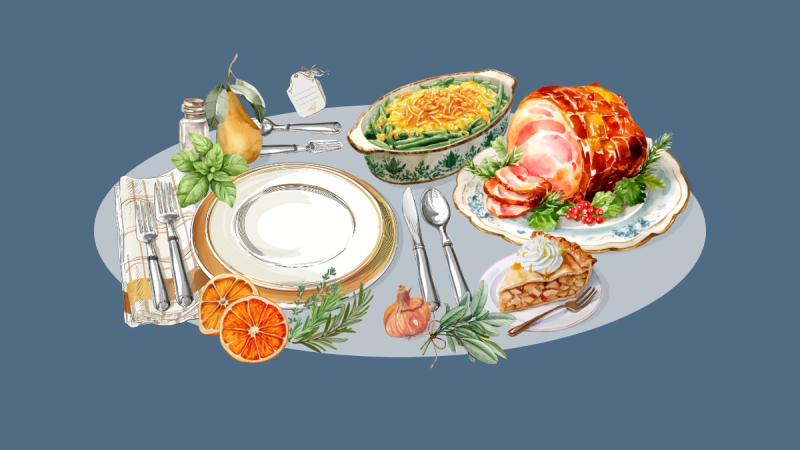Adam fell with a bite of forbidden fruit. Jacob bartered a birthright for a bowl of lentil stew. The Tabernacle—and later the temple—housed, among its holiest items, a jar of manna. Twelve loaves and wine were baked and poured daily by the priests in a mysterious offering that symbolized the very presence of God. The Author and Perfecter of our faith turned water into wine, multiplied fish and loaves for thousands, and finally gave his followers the most superior food of all—himself.
From Eden to Cana to Calvary, Scripture unfolds bite by bite and culminates in the wedding supper of the Lamb—abundant with marrow and well-aged wine.
This perspective on the biblical narrative raises an important question: Why did God make us so hungry?
In short, our insatiable appetite is a living parable. The story of humanity, in one sense, is the story of hungry people trying to satisfy their hunger, one way or another. This story reveals our insufficiency and showcases the God who alone satisfies. Physical hunger tutors spiritual hunger, inviting us to “taste and see that the LORD is good.” Good food, graciously given and gratefully received, becomes a daily rehearsal for the deeper nourishment found in the One who said, “My flesh is true food, and my blood is true drink.”
This lesson was likely not lost on Christians throughout most of church history, when food was scarce and daily life revolved around simply securing something to eat—let alone something enjoyable. But in our age of abundance, where the struggle is not getting enough but often having too much, we risk losing something even more essential than our next meal: the ability to see food as a deeply theological gift and eating as a daily act of embodied faith.
Thanksgiving As the Key to Christian Eating
Just because Scripture isn’t prescriptive in modern dietary terms doesn’t mean God is indifferent to how we eat. In fact, given our deeply broken food culture, it’s more urgent than ever to recover a distinctly Christian approach to food—one informed not by a handful of loosely interpreted verses, but by the whole counsel of Scripture.
To do so, let’s unpack the most pervasive New Testament dietary theme: thanksgiving—the indispensable seasoning of every meal. Paul writes, “Everything created by God is good, and nothing is to be rejected if it is received with thanksgiving” (1 Tim. 4:4). He expands that idea in Colossians 3:17: “Whatever you do, in word or deed, do everything in the name of the Lord Jesus, giving thanks to God the Father through him.”
It’s no accident that the church’s most sacred meal is called the Eucharist, derived from the Greek eucharistia, meaning thanksgiving. If this is the posture Christians take in the holiest of meals, shouldn't we rehearse that posture in all our meals?
Just as the church gives thanks for the perfect sacrifice of its Bridegroom, giving thanks at ordinary meals shapes us into people who humbly recognize our dependence on God. As Norman Wirzba puts it, food is “God’s love made nutritious and delicious,” and eating is “the daily reminder that life comes to us as a gift.” Gratitude shapes us into people who see the world as gift. In short, by giving thanks, we become Christians.
Food Ingratitude: A Uniquely Modern Conundrum
But this posture is deeply countercultural in Western society, where the modern food narrative undermines well-ordered gratitude on two fronts.
On one side, diet culture treats eating as a guilt-ridden negotiation: flavor on one side, health on the other, as if the table were a battlefield. There’s a collective impression that food isn’t something to receive, but something to guard against. Rich, satisfying foods like whole milk, butter, and bacon are often blamed for weight gain and disease, while so-called “health foods” are perceived as bland and unsatisfying—a limp salad here, a dollop of low-fat yogurt there. What’s for dessert? A glass of water?
As Episcopal priest and chef Robert Farrar Capon put it, “The modern diet victim sees his life at the table ... as a grim sentence which condemns him to pay for every fattening repast with a meal of carrot sticks and celery.” Modern diet culture burdens us with ever-shifting rules: count calories, fear fat, moralize carbs, micromanage macros. It promises control but delivers anxiety. Where is the gratitude in that?
On the flip side, the processed-food industry promises effortless pleasure: shelf-stable snacks engineered to light up dopamine pathways, grab-and-go breakfast bars, sugar-laden coffee drinks, artificially flavored chips, and frozen entrées built for convenience, not nourishment. These ultra-processed food-like substances hijack our hormones and satiety signals, flooding the body with sugar spikes, highly inflammatory seed oils, pesticides, and other synthetic additives that erode metabolic health. The result is a people both over-fed and under-nourished, both too dulled and too tired to give thanks for our food, let alone live an energetic life of gratitude.
Seeing Food in a Different Light
So how can we escape these worldly alternatives and foster dietary habits that lead to genuine gratitude?
Capon’s remedy is profoundly biblical: reclaim wonder. He offers that the key is to start thinking about food as God sees all his creation—as both completely unnecessary yet infinitely precious.
Why are beets different from onions? Why does God give us wheat, figs, lamb, and wine? He didn’t have to. He could have made one nutrient-rich paste for human consumption. We could eat as cows do, which are perfectly fine subsisting off grass for their whole lives. In fact, for a time, God did feed humans with such a food—manna in the wilderness. But even that wasn’t permanent. Why? Because humans were never meant to simply receive nutrients, but to cultivate taste.
Don’t get me wrong—fats, protein, vitamins, and minerals are all important considerations. But the greater purpose of food is to demonstrate God’s sheer generosity—the unnecessariness of the world that God nevertheless upholds for no other reason than that he likes to. He sustains a world bursting with flavor, color, texture, and form, not because he must but because he wants to. And he wants us to delight in it the way he does.
A well-ordered delight, fueled by wonder, is the key to a posture of thanksgiving for hunger well-satisfied.
From Table to Altar
God cares what we eat—not because he’s tallying calories or macros—but because he made food to be beautiful, satisfying, and life-giving, and he wants us to receive it as such. He made our bodies to be needy—requiring daily sustenance—so that we would have a framework for understanding what it means when he says that he alone is the Bread of Life who nourishes us eternally.
G. K. Chesterton said, “Thanks are the highest form of thought, and gratitude is happiness doubled by wonder.” When we receive our daily bread with delight in God’s wholesome provision, we cultivate genuine gratitude—not only for the food itself, but for the God who gives it. At the same time, we are far more likely to avoid abusing food or neglecting it, either guilting ourselves into starvation or overindulging on what does not satisfy.
To eat as a Christian is not merely to be free from Levitical dietary restrictions. It is to be free to faithfully participate in a world charged with the glory of God, to taste and see that the Lord is good, and to be reminded daily by his generous earthly provision that we are by grace nourished spiritually—body and soul—into the image of Christ.





